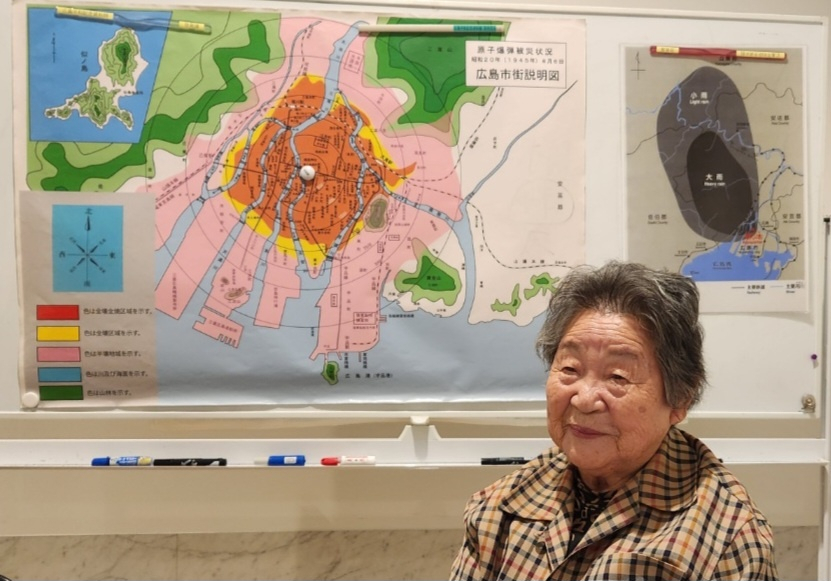[Herald Interview] Hiroshima survivor recounts tragic experience
By Choi Si-youngPublished : Dec. 20, 2023 - 18:58

TOKYO -- A nuclear bomb detonated as a 12-year-old schoolgirl was on her way to her family, on a train fleeing a war nearing its end.
“I heard the B-29 bomber flying over, which got me thinking, ‘The air raid warning isn’t on. What is that?’ Then I heard a blast and saw flames roaring,” said Park Nam-joo, recalling the day Hiroshima went up in flames on Aug. 6, 1945, which hastened Japan’s surrender and the end of World War II.
The 91-year-old Korean Japanese, who survived the atomic bombing because she was 1.9 kilometers away from the epicenter, recalled the horrors she had to endure.
“People were burned from head to toe. They weren’t asking for help,” Park said in an interview with reporters at the Hiroshima Peace Memorial Museum on Dec. 3.
The museum, located within Hiroshima’s Peace Memorial Park, was a venue that brought together the Group of Seven leaders in May for a regular summit. After a museum group tour, they laid wreaths and planted trees at the park.
“People were asking for (drinking) water. And I had been told not to do that because that could kill them. To this day, I really don’t know (what had led me to think that),” Park added. A monument to Korean victims at the park states about 10 percent of the 200,000 people killed by the bomb were ethnically Korean.
Not a single person who had asked for water survived that day, Park noted, saying that when first responders arrived at the scene the next day on Aug. 7, they did not make much difference. Survivors “had to incinerate the bodies one by one,” according to Park.
Since the bombing, Park has publicly spoken on the matter, revealing what the life after Aug. 6 was like as a survivor, and as a fierce advocate opposing using nuclear weapons. But one of the memorable moments or “rewarding days” has only come this year, during a meeting with President Yoon Suk-yeol.
The brief gathering, arranged by Yoon’s office on the sidelines of the Korean leader’s participation in the G7 summit in May, was the first time a sitting Korean president met with Hiroshima survivors in person. Yoon told Park he was sorry as president that the visit came late.
“All those years I have had to endure have now paid off,” Park told Yoon at the meeting. Yoon and Japanese Prime Minister Fumio Kishida later paid respects to Korean atomic bomb victims, also the first by the two leaders.
When asked if she wanted to share what she didn’t at the May encounter, Park told reporters: “I have nothing further to ask of Yoon or Korea for that matter, because I’m living in Japan and getting all assistance from here.”
The 91-year-old survivor was referring to cancer treatment prompted by radiation exposure. Still, Park said she was “grateful to be alive” and was “fortunate to have live this long.” The immediate days after the bombing, Park noted, were marked by humiliation.
“Korean Japanese had few options for relocation, as they had to settle within a 2-kilometer radius of the epicenter,” Park said of the early days when the city was annihilated. “Japanese used to call us names,” Park added.
The humiliation was soon replaced by emotions that Park said were “new to me years back then.”
“I saw Korea get liberated from Japan’s colonial rule while I was in Japan,” Park said. “I hadn’t quite figured out how my father must have felt when he shouted out in pure exhilaration upon hearing that news.”
“Unchained,” Park said of what must have crossed her father’s mind at that moment. The survivor, who speaks little Korean but fluent Japanese, added: “I was Korean Japanese. I hadn’t known I had this ‘wonderful’ homeland.”
This article was written in partnership with the Joint Press Corps.




















